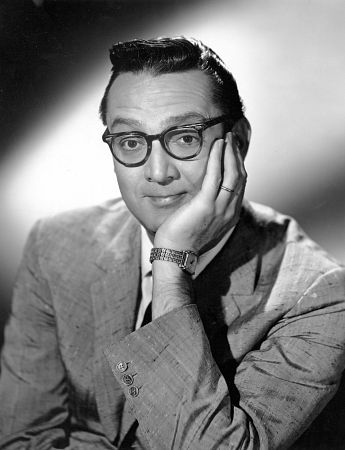
Comedian, actor, composer. Born Stephen Valentine Patrick William Allen, on December 26, 1921, in New York City. Allen’s parents were part of a vaudeville team, and he spent the first months of his life traveling with them from gig to gig. His father died when Allen was only 18 months old, and Allen was raised in Chicago with his mother’s family. In 1941, he won a journalism scholarship from Drake University in Des Moines, Iowa, but he left after only a brief time to study at Arizona State Teachers College. Drafted into the Army, he was discharged after several months because of his recurring asthma attacks.
Allen began his career in radio, taking a job as an announcer at KOY radio station in Phoenix, Arizona, in 1943. From 1947 to 1950, he hosted a radio talk show at KNX, the Columbia Broadcasting System (CBS) affiliate in Los Angeles. He made his first forays into the new medium of television during these years, appearing on game and talk hows. In 1950, CBS hired him to host his own half-hour television comedy show, which lasted for two seasons.
While serving as a panelist on the popular CBS game show, What’s My Line? in 1953, Allen caught the attention of producers at the National Broadcasting Company (NBC), who were working a new late night TV program that would be a combination talk show-variety show. With the wisecracking Allen as the host, The Tonight Show debuted on NBC in September of 1954 and became a smashing success. Allen quickly made the format his own, blending witty monologues with guest appearances and skits to create a unique and winning late-night TV formula.
In the summer of 1956, the network added a Sunday night prime-time variety show, called The Steve Allen Show, to its lineup as a competitor to The Ed Sullivan Show on CBS. Allen cut back his duties on The Tonight Show later that same year, and Jack Paar became the show’s new host. (Paar was succeeded by Johnny Carson in 1962; Carson, the show’s longest-running host, handed the reins to Jay Leno in 1992.)
Among the comedians and musicians who gained a measure of stardom due to their appearances with Allen on The Tonight Show and The Steve Allen Show (which ran through the 1959-60 season and continued in syndication throughout the 1960s) were Don Knotts, Andy Williams, Steve Lawrence, Eydie Gorme, and Gene Rayburn, the original announcer of The Tonight Show. After his regular show ended in 1960, Allen hosted The Steve Allen Comedy Hour (1967) and similar variety shows on NBC in 1980 and 1981. From 1964 to 1967, he served as the moderator of the long-running quiz/panel show I’ve Got a Secret.
Though he reached the peak of his fame in the 1960s, Allen continued working in television throughout the next several decades. In 1977, he and his second wife, the actress Jayne Meadows, launched a series called Meeting of the Minds on the Public Broadcasting System (PBS). The program offered viewers imagined conversations between notable figures in history such as Genghis Khan, Emily Dickinson, or Galileo. The show ran on PBS from 1977 to 1981.
On the big screen, Allen starred in the 1955 biopic The Benny Goodman Story and portrayed himself in films ranging from The Comic (1969) to Casino (1995). An accomplished pianist, who nonetheless never learned to read music, Allen composed more than 5,000 songs, including such hits as “This Could Be the Start of Something Big,” “Impossible,” and “Gravy Waltz.” He also wrote scores to several films, including A Man Called Dagger (1968) and the CBS musical Alice in Wonderland (1985), and the music and lyrics to a Broadway musical, Sophie, which ran for only eight performances in 1963.
The indefatigable Allen wrote more than 50 books in his lifetime, all of them dictated into a small tape recorder that he carried with him everywhere. Ranging from novels to poetry to social criticism to humor, the books reflected Allen’s sharp wit and his dedication to social justice. He was a vocal opponent of capital punishment and nuclear proliferation, and wrote pamphlets on such issues as the problems facing migrant workers in America. In the late 1990s, he became a public voice against what he felt was a precipitous decline in the moral standards and quality of television.
Allen continued to perform throughout the 1990s, making frequent guest appearances on television retrospectives and even taking on the title role in a 1995 production of The Mikado staged in New York. He and Meadows, whom he married in 1954, had one son, Bill; Allen also had three children from a previous marriage to Dorothy Goodman. Steve Allen died of an apparent heart attack in Los Angeles on October 30, 2000, at the age of 78.
© 2000 A&E Television Networks. All rights reserved.